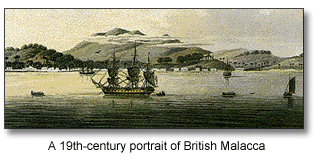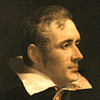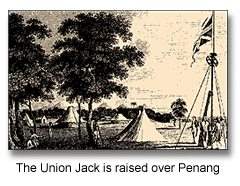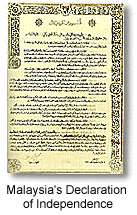TEXT OF THE PANGKOR TREATY HELD ON 20 JANUARY 1874 1) Raja Abdullah was acknowledged as the legitimate Sultan to replace Sultan Ismail who would be given a title and a penchant of $1000 a month. 2) The Sultan will receive a British Resident whose advice had to be sought and adhered to in all matters except those pertaining to the religion and customs of the Malays. 3) All collections and control of taxes as well as the administration of the state had to be done under the name of the Sultan but arranged according to the Resident's advice. 4)The Minister of Larut would continue to be in control, but would no longer be recognized as a liberated leader. Instead, a British Officer, who would have a vast authority in administrating the district, would be appointed in Larut. 5) The Sultan and not the British government would pay the Resident's salary.
Sir Thomas Stamford Raffles |
| Colonial Malaysia 1511 AD - 1957 AD | ||
At the beginning of the 16th century, the
eastern spice trade was routed through Egypt, and
no non-Muslim vessel was permitted to dock in
Arabian ports. The competing European powers,
painfully aware of the need for an open trade
route to India and the Far East, sought to
establish their own trading ports at the source.
In 1511, a Portuguese fleet led by Alfonso de
Albuquerque sailed into Malacca's harbor, opened
fire with cannon, and captured the city.
Malacca's golden age had come to
an end. 
The Portuguese constructed a massive fort in
Malacca - A Famosa - which the Dutch
captured in turn in 1641. This would give the
Dutch an almost exclusive lock on the spice trade
until 1785, when the British East India Company
convinced the Sultan of Kedah to allow them to
build a fort on the island of Penang.
The British were mainly interested in having a safe port for
ships
on their way to China, but when France captured
the Netherlands in 1795, England's role in the
region would amplify. Rather than hand Malacca
over to the French, the Dutch government in exile
agreed to let England temporarily oversee the
port. The British returned the city to the Dutch
in 1808, but it was soon handed back to the
British once again in a trade for While the European powers played their regional chess game, the local Malay sultanates continued on their own affairs. After Malacca was captured, the new Muslim trading center became Johor, then later on Perak. Both the Minangkabau Immigrants from Sumatra and the Bugi people from Celebes immigrated to the peninsula in large numbers, leavingn lasting cultural contributions. In the late 1860's, a number of Malay kingdoms began fighting each other for control of the throne of Perak, causing enough of a disturbance in the region to inspire Britain to intervene and essentially force the Malay rulers to sign a peace treaty known as the Pangkor Agreement in 1874. The treaty, unsurprisingly, gave Britain a much greater role in the region - a role it would need in order to maintain its monopoly on the vast amount of tin being mined in the peninsula.
Ancient Malaysia | Hindu Kingdoms | The Golden Age of Malacca | Colonial Malaysia | Independence and Onward Home | Places | People | History | Nature | Activities
|

 Bencoleen,
Sumatra. The Dutch still largely controlled the
region, however, and in 1819 Britain sent Sir
William Raffles to establish a trading post in
Singapore. These three British colonies - Penang,
Malacca, and Singapore - came to be known as the Straits
Settlements.
Bencoleen,
Sumatra. The Dutch still largely controlled the
region, however, and in 1819 Britain sent Sir
William Raffles to establish a trading post in
Singapore. These three British colonies - Penang,
Malacca, and Singapore - came to be known as the Straits
Settlements.  Coupled
with the power of the White Rajas in Borneo, Britain ruled
over what was then called Malaya until the Japanese invaded
and ousted
them in 1942. During this time, large numbers of Chinese fled
to the jungle and established an armed resistance which, after
war's end, would become the basis for an infamous communist
insurgency. In 1945, when W.W.II ended, Britain resumed control
again, but
Malaya's independence movement had matured and organized itself
in an alliance under Tunku Abdul Rahman. When the British flag
was finally lowered in Kuala Lumpur's Merdeka Square in 1957,
Tunku became the first prime minister of Malaya.
Coupled
with the power of the White Rajas in Borneo, Britain ruled
over what was then called Malaya until the Japanese invaded
and ousted
them in 1942. During this time, large numbers of Chinese fled
to the jungle and established an armed resistance which, after
war's end, would become the basis for an infamous communist
insurgency. In 1945, when W.W.II ended, Britain resumed control
again, but
Malaya's independence movement had matured and organized itself
in an alliance under Tunku Abdul Rahman. When the British flag
was finally lowered in Kuala Lumpur's Merdeka Square in 1957,
Tunku became the first prime minister of Malaya.